Replacement Trailer Hub Bearing - LM67048

Thank you! Your comment has been submitted successfully. You should be able to view your question/comment here within a few days.
Error submitting comment. Please try again momentarily.
- All Info
- Reviews (182)
- Q & A (0)
- Videos (2)
- Photos
etrailer Trailer Bearings Races Seals Caps - LM67048
- Bearings
- Standard Bearings
- 5000 lbs Axle
- 6000 lbs Axle
- Bearing LM67048
- etrailer
- Race LM67010
High-quality, tapered roller bearing is designed for high-speed use. Replacement part uses industry-standard number.
Features:
- Inner diameter: 1.250"
- Matching race (sold separately): LM67010
- Application: outer bearing for 8-201-5 and 8-213-5 hubs
- Equivalent to Dexter part 031-032-02
LM67048 Replacement Bearing
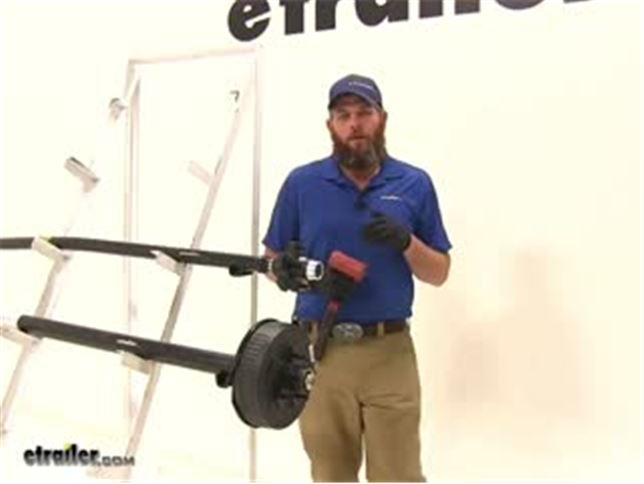
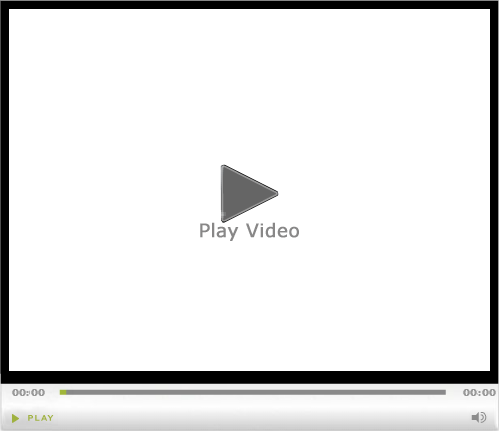
Videos are provided as a guide only. Refer to manufacturer installation instructions and specs for complete information.
Video Transcript for Trailer Bearings Races Seals and Caps Rebuild
Speaker 1: Today we're going to take you through the rebuild process on a couple of hubs. We've got an idler hub, and here we've got a hub and drum assembly. Works with electric rigs, but this can also work for just standard discs, if you've got a disc brake style setup.Basically what we're going to show you is how to get all of the bearings out. How to remove the seal. How to remove the race's if they're damaged, then get them replaced in the proper manner. We'll show you how to use an easy loop hub, which we have here.The first thing we are going to need to do is, get the grease cap off the end.
It can have either a rubber plug in it like this one does, or it can be a solid metal cap.These are pressed fit in there, basically by tapping on them on the back side. To remove them, a deadbolt hammer is typically what we're going to use. We're just going to start tapping as we go around. You'll see a little separation start right here, and slowly it'll work it's way off.Now the next step's going to vary a little bit depending on your axle setup. Do you see this is going to have a keeper that goes around the nut.
And that prevents that from being backed off, or removed. A lot of times you'll have a castle nut, which will have just little tabs that stick off, and there will be a cotter pin that passes through it. Just depending on your application, you need to get the keeper for the nut off. This style we just kind of pry out. A cotter pin you would just remove of course.Once we have that off ...
We'll start to take off the nut here, and the washer that's in behind it. Now yours should look a whole lot more dirty than this. There should be a lot of grease packed in, and through the hub, this one's brand new. We thought it'd be nice to show you the components before the grease was on .. Of our washer that comes off.And then here we're going to have our outer bearing.
Continue to pull that. We're gonig to have our inner bearing here. That sits in the backside of the hub. And we didn't put it in yet, we will show you how to put it in. But a seal would typically be covering the backside here. We'll show you how to use a seal removal tool, or another tool. To get that pried up and out. To get an access to that inner bearing.Now for a drum style like this, that process for disassembly is going to be just the same. One thing to keep in mind if you're using a disc brake setup. You'll have to remove the caliper before the disc is going to come off.Now once we have the spindle exposed, as we said this is going to be really greasy. We want to get all the grease removed, and the first thing we'll do is inspect it. We want to make sure that it looks just like what we have here. Everything's nice and smooth. We don't see any kind of discoloration, or any marring on the metal. Indicating that our bearing's got hot.If you do have any of those symptoms, at this point it's time to replace those bearings. You don't want to repack them. Get new bearings, and put in there. You might have a bearing that's come apart in here. Another surface to ensure is in good condition, is where your seal is going to go. That helps seal all the grease inside of our hub. With a damaged or broken seal, that grease is going to seep out. Either out of the hub, or in this case into our brake assembly.Now if your axle has brakes, we're also going to check the disc. Make sure it doesn't have any issues, or your hub. And this is going to be a hub and drum assembly. The brakes are going to ride on this machine surface. You're going to check that for signs of excessive heat, discoloration, or cracking. And this is our magnet surface. We'll check that surface for the same issues.Now inside the hub regardless if it's a disc brake, it's a drum brake like this. Or just a standard idler style hub. You're going to have an outer race. Would be right here, it's a small tapered piece of metal your bearing sits in, and rotates on. That's basically the outer portion of the bearing.You have the same thing here on the backside. This is called the inner race. Now if those show any signs of wear, overheating, or cracking. Those are also something we'll need to replace, which we'll show you how to do in just a minute.Now, with your brake assembly exposed, if you do have electric brakes like we have here. It's a good idea to check all the components for wear, cracking, maybe missing pieces. Check your pad thickness to make sure those are in good shape. Basically if you have a non working brake assembly and you put everything back together, you're just going to have to take it apart and do it all over again to get back to the brake assembly. This gives you a really good option to be able to change them out.And most applications are going to use a four, or maybe a five bolt flange to hold them in place. And you'll just remove the lock nuts, or sometimes you'll have a hex nut with a lock washer. You want to remove those, and then simply slide your assembly off after you cut the wiring.The friction material itself should also be checked for any kinds of cracking, or overheating. If you have any grease inside the system at all, it's likely it's gotten on those pads. It's a good idea to get those changed. Now as far as the removal of the races go, it's going to be just the same whether we're using an idler style hub like we have here. A drum brake like we have here. You can basically see where the idler is, here in the middle of the hub. It's going to go all the way around there, and we just have this extra material here to provide our braking surface.Now if you're doing a disc brake style job again, it's going to be just the same here with the races living inside of the actual hub portion. You'll just have the discs there for the brakes to make contact. We're going to use this little bit smaller one, it's a little bit easier to manage to show you how to get these out. We've talked about where the races are. The outer here, the inner being closer to the inside, but on the backside of the race there's a little lip. That lip's meant to stick out just a little bit further than the hub, and provide us an area to put our tool on, and help to drive that out.If you look all the way through there on that inner race, you'll see that little lip that sticks out just from the hub slightly, and it gives us enough area to use our tool on. Now generally to remove these you're going to use a punch, similar to this. Some guys will use a screwdriver. Or a piece of pipe. If you have a piece of pipe that's small enough to fit inside of that diameter, you can take that down through and allow it to rest on that lip.Use our punch, and then just need a hammer. And we'll start working that out. We're going to tap all the way around. Kind of equally, and evenly apply the force to get it to come on out of the bottom for us.You can see now as it starts to come out there's going to be a little gap created between the hub and the race. And we can just keep going, bringing it on out. Then you can inspect the inside of the hub surface there. Make sure no damage or anything has occurred, and repeat that same process for the outer race if you plan on removing and replacing that one.Now in the outer flat edge, you can see we're going to have our tapered edge on this side. If we roll our race over to the flat side, typically there's going to be a manufacturers part number on there. That will help you identify which race it is, that you need to go back in your system. If those are rubbed off, worn off, if you can't read them. You can measure the outside, to outside diameter of the race here. It's a good idea to use a micrometer to get it exact.Now here's your basic micrometer. And again, the outside of the race is what we're going to need to measure. You want to go . I set the thickest point there. Looks like this one's going to be about 1.98. That's going to be the measurement you'll want to supply.Now while we've got this out, let's also look at the proper way to measure our bearing. Instead of the outside for the bearing, we need to measure the inside diameter. That's going to be pretty simple. Let's pull that out, find the largest measurement we can. Which here, looks like it's going to be 1.03. With that information, we'll be able to get the correct bearing, and the correct race, so they'll fit together properly and make a full bearing kit for us.Now here's the race, we're going to show you how to get this put back in. Basically just going to press fit inside of our hubs. We need to get it down on there. Kind of like that. And you'll have a couple options. A lot of times you're going to see do it yourself or at homer, just going to use a wooden block. Just place it on there. That's going to get you started, but at that point you'll struggle in getting it to go all the way down into it's seat.Now to take care of that problem, there are several seal drivers that are available. Seal and race drivers that are available out there on the market. It's designed to fit down inside of our race, inside of our hub and get it down there where it needs to go. This is part number ptw83020, has several different sizes, even if you have multiple trailers it's going to do the job.Now the side with the angle on it, is designed to fit down inside of our race. If we use the other side, that's going to be for driving your seal into place. Just want to hold it, and take it on in with your hammer. You'll see, you just want to insure that our race is all the way up against that line on the hub where it's supposed to mate to.Now when it comes time to pack your bearings you're going to have several different ways of doing this. You can just use your hand, is the traditional method. That's going to be the method probably reserved for the very occasional trailer work kind of situation. If you do it once or twice a year, probably get away with it that way.Next you would go to a, kind of a sandwich funnel style almost. If you look inside of there, you can see the bearing. It's located between the two pieces. Just use a grease gun. Start filling that with grease, and that's going to fill our bearing for us. And the third, with this one you're just going to place your bearing down and in. It should be pretty close to center. And then we've got our cone her that's going to go down and secure that.Now I think this style, wastes a little bit more grease than what this style will. This has a dust cap. You can see, you can keep your grease in there, put your dust cap on there and save it for later use. This will be if your going to do it every couple years. And this particular style would be if you're a more regular user.Let's start by showing you how to use a bearing packer. Similar to this. Again, we've just got our grease inaudible 00:11:07 here on the top. And then just slowly start to fill it. Now I like this style quite a bit. I think even regular users might enjoy it, because you can get a really quick visual look at that bearing. You're not going to have to overdo it, or have to much grease.You can kind of see in there now, we're starting to get grease to come out of it. Couple more pumps, we'll be good. You can see we've got grease coming out all the way around. Where all of our bearings are. Got a little bit of excess there. Just take that around the outside of it. And then we should be able to lift it off. And now you can see what we we're talking about. Just a little bit of excess there, that you're just going to wind up wasting.Now we'll take our bearing, we're going to place it right down in our race. And then we'll cap off the back with our seal. Right now our seal's going to fit in just like our race did. It's going to have a little bit of a pressure fit to it. Now very often in this situation, I see people using the four by four method. Kind of here, just placing that on and tapping it. As an option though, if you do have one of these. You can see that's designed to fit right on the top of the seal. And help drive it in.The biggest thing here is, just going to be getting it driven in squarely. You can see, this side's in a little bit further than this side. I'm going to start this side first. Now since we didn't have the opportunity to show you before, we're going to take a look at pulling a seal. Now this is a seal puller, we carry this on our website part number ptw1219. This is meant to hook underneath the seal. And then you kind of pull up on it, and just like our race you'll have to work all the way around that edge. Just bringing it out a little at a time.If you don't have that available. Another option would be a screwdriver. You just kind of get that under the seal, and turn it. And see, that'll allow you to also pop that out. We've taken care of our race. Our inner bearing. Our seal. The last component, before we put our hub back in place is going to be our outer bearing. Now with this bearing, I'll show you the hand packing method.This is definitely . Slightly dirtier method than the bearing packer. When we get grease on our hand we want to look at the larger side of the bearing. This is the smaller side. We have a larger side In between the inside and outside there's a gap. We can see our rollers in there. We want to grab that, and use that gap and shove grease inside of it. Now this is going to take a little bit, you want to work in the same spot until you get the grease pushed all the way through. We can see on the top there we've got a little bit starting to come through.And once we push it in the bottom, and you see it start coming out the of the top in those little drips, it's going to indicate that, that section's fully packed. Just need to work all the way around their outside edge now and do the same thing. Alright, once that's all the way around . The bearing will be ready for use.Now one more thing I like to do. We can see our inner bearing there, and our outer bearing. Well between the two, got a pretty big gap in there. If you'll take a . Pretty good amount of grease. We're just going to go all the way around. See how we can go all the way around the inside and just line that really well. The more grease we have in here, the less chance we have of any moisture getting in there, which can cause corrosion, rust, pitting. Pretty much things we do not like when it comes to bearings, races, and hubs.Put plenty of grease in there. And then this one does have the easy lube spindle, that'll even fill it in more. Now we can get our assembly slid on. I like to keep my thumbs on that outer bearing, just to prevent it from . inaudible 00:15:28 pushed off there. Now we can put on the original hardware that we removed, in taking off our hub the first time. In our case, we had our washer and our nut.Now most commonly you'll see pliers similar to this being used. We basically want to get that tightened down. Once it's fully tightened down you'll feel some resistance in the hub. We back it off just slightly. That'll give us a little bit more freedom of motion there. Something you don't want however . Is any movement in, or out on your hub. You want to be sure that everything is compressed, and you don't have what's called end play. Which would be the play in and out.Once we've got that set, then you'll put on whatever tight keeper yours came with. Get that put back in place. Now with an easy lube style hub, you're going to place your grease gun on the end, and then you can just fill the remainder of that hub up.Now for your typical applications, you're either going to have a solid cap, or a cap that'll have a rubber plug in it. A solid cap's going to be for an axle without the grease inaudible 00:16:51 here on the end. Goes on there. Just knock it on with your rubber mallet. Same with the one with the plug. Just gives you a removable area there, be able to cap that off.We'll show you how to put that on. Now as alternatives as well, a lot of times on boat trailers and marine kind of situations. You'll see a bearing buddy. This is going to apply a little bit of pressure on the grease, you'll fill it up. This kind of comes out just a little bit. That applies constant pressure on the grease to make sure we don't have any air, or anything like that. Then there is also an oil bath hub available. Now this is going to be for use with seals that are going to be designed specifically for oil bath use. You'll have to change that seal.We're using a double lip seal. There are also single lip seals available. Of course a double lip seal is going to give you just a little additional security. Keep that in mind when you order. But let's get this knocked on there now so you can see how that works. We just want to take the cap, we're going to center it. This is going to be very similar to what we did with the seal. And then just gently start tapping it around the outside. And it'll seep down on there for you.It's really going to be the same thing that you'll do with any of the end caps. Now with this side done, it's a good idea to take care of all the other hubs. Get them all on the same maintenance schedule. And as long as you'll periodically check the grease, take your trailer out for a trip occasionally. Just to keep everything lubricated. It should extend the life of these parts, and give us years of good service.
Customer Satisfaction Score:
99% were satisfied with this product
1% of customers were not satisfied
- Wrong item was ordered
- etrailer mistake
- Product did not meet expectations
Customer Reviews
Replacement Trailer Hub Bearing - LM67048 - LM67048
Average Customer Rating: 4.7 out of 5 stars (182 Customer Reviews)
High-quality, tapered roller bearing is designed for high-speed use. Replacement part uses industry-standard number.Bearings loose in the box with heavy suspension parts.
Qusily bearings!
This rating is for the packaging only, shipped very poorly with no protection. four sets of bearings thrown in a box,
Had to return. (photo enclosed).

Everything fit properly and installation went smoothly. All needed parts were included, which was nice. The self-adjust worked well and break-in was quick.
I've only put about 1500 miles on the trailer since install, so I can't speak to longevity.
I'd buy them again though.
Direct fit for my old was a U-haul trai ler.

The parts actually went into a farm wagon. No problem exact fit and less expensive than the local parts store
flawless transaction, customer service was a huge help finding the correct parts.
Received all items, all are perfect!
Got this bearings as a back up kit for my travel trailer
PROS: The parts came in on time.
CONS: Three of the four inner bearings were the wrong size. I went to O'reillys to get the correct bearings for the job. I use the trailer for work and couldn't wait for etrailer to send me the right bearings. I am currently waiting for a shipping label to send back the wrong bearings for a refund.


Mike L.
1/29/2018
Ill have one of our customer service folks contact you in order to handle this. I apologize for the inconvenience.
Excellent knowledge and follow up. My only stop for trailer parts

I have a boat trailer that requires wheel bearings and seals periodically. It is 20 years old but I easily found replacements at etrailer.com. I bookmarked the parts so I can get them easily next time. Noticed that the original bearings were made in England, the recent ones are made in China and are of equivalent excellent quality. Delivery was prompt, packing very good.
Good retailer.

I replaced the bearings on my 5th wheel with these bearings, they fit as expected. After 7000 miles they are holding up well.
Michelle ...I appreciate the expertise that you used in putting together a wheel/bearing package. Everything was fine ,delivery was speedy ...2 days
The packing person really made a mess. The hub assemblies were allowed to come out of their poorly packed box. The hubs bent one of the bearings and 2 seals. The bearings and seals were in an unprotected plastic bag...not in a protection box...
Fortunately, I called and the damaged parts were sent to me,quickly I might add. I hope you can review the packing process ,and solve this issue

Installed these bearings and races on my trailer after failure of the manufacture bearings failed because they saved money by not properly lubing at the factory. These have held up well putting on over 40,000 miles and proper lubrication.
So,
I needed new bearings and seals for a 1980 travel trailer wherein the axle, hubs and bearings had no markings. Diana (CSR) helped me work through through the options and was able to identify the correct parts. The bearings and seals came in and were a perfect fit. Everything was on time and intact. Very happy with my first etrailer buy.
Removed trailer outer bearing to find a scored "race". Customer Service, extremely helpful and patient in trying to match up a few visible number on the old bearing and race to list of available options in etrailer's stock. Part was a perfect match, pressed in race. assembled hub and wheel, and back in business.
I have a late 70's boat trailer that needed new tires and wheel bearings... no kits available so I called etrailer and talked to Kayla. We figured out everything over the phone, Kayla got all the the correct bearings and seals to me fast! The tires I ordered where out of stock, but I was upgraded to the galvanized wheel for free!!!
Thanks Kayla!!!
PROS: The package came in on time.
CONS: Three of the four inner bearings were wrong. I went to O'reillys to get the correct parts. I cannot wait for etrailer to send me the right ones since I use this trailer for work. I am currently waiting for the shipping label to send back the wrong bearings and get refunded.
Item as described. I have never replaced wheel bearings/seals, I always had someone else do it. This time I tried it on my own, and the parts I ordered/received fit as expected and all is well.
thank you etrailer!
All parts ordered to replace a complete brake system on a 25-year-old boat trailer fit perfectly. Ashly from etrailer was very knowledgeable regarding are needs. Thank you!
Perfect fit for my Q633 hub. The associated grease seal was an SL150 which was difficult to find but the etrailer rep tracked it down and now my trailer is FINALLY back up and running! All my future business will go to etrailer.com.
I had a non standard axle, so had to call and verify bearings. Was very pleased with the service and that the person on the other end was very easy to understand. Shipment was fast and the parts fit. The price was very competitive.

I used this to replace a bearing on my Hudson HBC10 equipment trailer. The fit matches the old bearing and it's held up fine one year later.
All the bearings, races, and seals I have purchased from etrailer have been good quality and have never failed. I have used them in my travel trailer for many years.
See what our Experts say about this etrailer Trailer Bearings Races Seals Caps
- Replacement Hub Drum for 5200 lb Dexter Axle on 1971 CamperGood question. The spindles of your trailer could be three possible sizes. If you pull your hubs and look at the bearings (both inner and outer) as well as the seal, there should be a number on the face of each one. If you can match those bearings and seals in one the options listed below then you will have a perfect fit. If not, let me know the numbers and I'll see if there is another compatible bearing. If you can't find bearing numbers, then you will need to measure your spindles...
view full answer... - Can Electric Drum Brakes Be Installed on Prestige Boat TrailerElectric drum brakes are more common on boat trailers than they once were, and for the very reasons you mention: lower cost and easier installation than hydraulic surge brakes. More and more marine trailers are being factory-equipped with electric drum brakes and they can be used safely by always unplugging the trailer connector from the tow vehicle before the trailer enters the water. I linked a helpful overview article on this process that covers the whole conversion and all the items...
view full answer... - Replacement 5 on 4 3/4 Hub With LM67048 Inner Bearing and LM11949 Outer BearingWith your hub having an inner bearing # LM67048 and outer bearing # LM11949, it sounds like you have an agricultural style hub, like the Redline Trailer Hub Assembly # AH15450ECOMP. However, this will have a 4 on 5 bolt pattern and this will be the only bolt pattern this hub is offered in, unfortunately. With that being said, the best option we can recommend will be to replace your axle with something that uses more common parts. Though you will need to measure a few things, picture included,...
view full answer... - Recommended Hub and Drums for Motor Home Axle with 25580 Inner and LM67018 Outer BearingTypically converting a mobile home axle is a challenge, but the drawing you provided shows that your spindle uses an # LM67048 outer bearing and # 25580 inner bearing. These are both fairly common bearing sizes, so there is an available solution. To replace the hubs you can use the Dexter # 8-201-5UC3, which has the same inner and outer bearing, so it will fit on your spindles. These hubs have a 6 on 5-1/2" bolt pattern, so if you don't already have wheels with that pattern you can use...
view full answer... - Replacement Bearings and Seals for Older TrailerThank you for providing the original bearing and seal numbers from your old trailer. These part reference numbers are often the best method for finding replacements, although especially with older trailers often alternate parts may have found their way into the trailer during its lifetime. We do have the bearings # LM67048 and # LM11949 as well as their matching races, parts # LM67010 and # LM11910. Please note that both of these bearings have an application as an OUTER bearing. The part...
view full answer... - Bearing Replacements for AL-KO T44 Trailer AxlesThe Al-KO T44 axle uses the bearings # L68149 inner bearing and # LM67048 outer bearing. For the seal you'd need the part # RG06-050 and you'd be set.
view full answer... - Which Bearings, Races, and Seal Fit Dexter Hubs 8-283For the inner bearing you need # LM67048 and race # LM67010. The outer bearing is # L44649 and race # L44610. The seal is # 10-42.
view full answer... - Bearings for a Dexter Trailer Hub 8-222I called Dexter Axle and they were able to inform me that your Dexter Trailer Hub 8-222 uses a part # L68149 inner bearing, part # L68111 inner race, part # LM67048 outer bearing, part # LM67010 outer race, and a part # 10-40 grease seal. Unfortunately, we don't have a bearing kit with all of these parts for you so they will need to be purchased separately.
view full answer... - Upgrading Axles On Equipment Trailer To Standard Spindles To Replace Dexter 8-222 DrumsI have an option but the Dexter 8-222 drums you have on your trailer are primarily used on mobile homes and the only parts we have available for them are the inner bearing # L68149, outer bearing # LM67048, and grease seal # 10-40. My recommendation is to replace the axles which will give you standard spindles and make finding replacement parts now and in the future easier. To know which axle, you will need you will need to measure your current axle's hub face to hub face and spring...
view full answer... - Replacing Hubs On A 1988 Terry TrailerI can certainly point you in the right direction. I will say that since the trailer is about 35 years old, replacing the hubs may prove difficult. A lot of sizes that they used back then are basically obsolete these days. For example, the inner bearing # LM67048 is highly uncommon nowadays. Unfortunately, we do not have any hubs available that will meet your specifications. There may be secondhand parts out there, but I see that as a long shot. Your best bet will be to either replace the...
view full answer... - Replacement Bearings, Races and Grease Seals For a EZ Loader Trailer with 6 Lug HubsI reached out to EZ Loader with your VIN and they informed me your hub takes the following parts. Inner Bearing # 25580 Outer Bearing # LM67048 Inner Race # 25520 Outer Race # LM67010 Grease Seal # GS-2125DL Cotter Pin # 165649
view full answer... - Replacement Bearings Races And Seals For Agricultural TrailerI was unable to find Timken bearings with the LM11949 part number. The part # LM11949 we carry is a replacement outer bearing for AH15450E agricultural hub. These have an inner diameter of .750 inches. The matching outer race for this bearing is part # LM11910. The outer seal that works with this bearing and race is part # SL150. We do not currently offer a kit that includes the # LM11949 bearings. I highly recommend replacing the inner bearings, races, and seals at the same time....
view full answer... - Recommended Disc Brake Assembly to Replace UFP Brakes on Boat TrailerWould you be able to tell me what you mean by alternatives or are you looking for the entire assembly?
view full answer... - Economical Option for Trailer Wheel With 5 on 5-1/2 Bolt Pattern and Trailer TiresIt sounds like you are just looking for the most economical way to add trailer tires and wheels with a 5 on 5-1/2" bolt pattern but are concerned they won't fit when you replace your axle. Realistically this is a valid concern and your axle may in fact not have spindles that accept a hub with the same 5 on 5-1/2" bolt pattern so you may need to get new wheels and tires when you decide to do that. For now, the most economical option for you to wheels and tires is first with the Modular...
view full answer... - Bearing Identification for Selecting Replacement 6-Lug Trailer HubWe do have one agricultural hub that uses the inner bearing LM29749, that is the Redline 6-on-6 hub # AH30660FCOMP that you referenced. This hub is rated for use on a 3K axle. The outer bearing in this hub is part # LM67048. We have no hubs that use outer bearing L44640 but we do have hubs that use two other outer bearings with very similar part numbers. I think one digit of your part number might be wrong. Bearing part # L44649 is often used as the outer bearing in a hub rated for use...
view full answer... - How to Determine the Correct Parts for a Bearing Kit for a 5,200 lb Dexter Trailer AxleFor your 2006 Colorado fifth-wheel trailer with 5,200 lb EZ Lube axles, there are a couple of possibilities. The best way to determine the correct parts is to disassemble a hub on one side of the trailer and get the bearing part numbers off of the bearings that are on the spindle. I put together a drawing showing where part numbers are and/or how to measure to determine the correct parts for trailer hub and drum assemblies, see link. If your hubs have a 6 on 5-1/2 inch bolt circle, you...
view full answer... - Can 3500lb Axle W/ 89" Hub Face and 74" Spring Center Be Replaced W/ 5200lb Axle W/ Same Dimensions?Since the Dexter 3500lb axle on your single axle trailer has a hub face measurement of 89" and a spring center measurement of 74" the Dexter Trailer Axle Beam with E-Z Lube Spindles - 89" Long - 5,200 lbs will work as a direct replacement. You will not be able to reuse our hubs/brakes or U-bolts as this axle uses different bearings than your current axle, and is 3" in diameter where your current axle is 2-3/8" in diameter. For hub and drum assemblies you will need # 8-201-5UC3-EZ which...
view full answer... - Idler Hubs to Fit a Mobile Home Axle on a Gooseneck Trailer with Bearings 25580 and LM67048We do have some idler hubs, without the drums, that fit bearings # 25580 and # LM67048. All of them have a 6 lug bolt pattern. We have two, part # 8-213-5UC1 for standard axles and # 8-213-5UC1-EZ for E-Z Lube axles, that use grease seals 10-10, part # RG06-090 and have a 6 on 5-1/2 bolt pattern. The other is an agricultural hub and is more likely what fits your mobile home axles. It's a 6 on 6 bolt pattern and uses the same bearings but instead fits a 42385 grease seal, part # GS-2250DL....
view full answer... - Replacement Parts or Replacement for Mobile Home AxleWhat parts are you needing, exactly? If you need bearings and a grease seal, we can likely help you there but for replacement hubs, we don't offer anything that would work with bearing sets with the dimensions you mentioned. If you could reply with the reference number from the inner race or bearing, I'd be happy to recommend a replacement inner bearing and grease seal. Your outer bearing dimension points to a # LM67048 bearing which uses a # LM67010 race. Mobile home axles are a one-time...
view full answer... - Determining Correct Replacement Bearings and Seals for 6,000 Pound AxlesSince the current hubs on your trailer use the # 25580 inner bearing, there are a few possible options for the exact outer bearing replacement. Most likely, the outer bearing you need will be # 14125A, # 15123, or # LM67048. These all feature the same 1.250 inch inner diameter, meaning they will all fit the spindle on your trailer. However, they each will have a slightly different outer diameter, which is what needs to match up with your current hubs. Since you cannot read the number...
view full answer... - Determining Which Hubs Will Fit Mobile Home Axle W/ 1.37" Inner Bearing and 1.25" Outer BearingWe may have an option that will work for you, but you will want to double check the spindle where the inner bearing rides. The Trailer Hub and Drum Assembly - 4,400-lb E-Z Lube Axles - 10" Diameter - 6 on 5-1/2 # 8-407-5UC3-EZ which uses inner bearing # L68149 with an I.D. of 1.378", and outer bearing # LM67048 with an I.D. of 1.25". If your spindle is 1.378" where the inner bearing rides this would work for you. This hub and drum assembly is designed for 10" braking assemblies # K23-462-463-00. You...
view full answer... - Replacement Bearings for Dexter 8-222 HubI looked up your Dexter 8-222 Hub and was able to find the inner and outer bearing numbers as well as the grease seal used. It looks like this particular hub was designed for mobile homes and these, for the most part, have more unique bearings and bolt patterns because they are technically manufactured for one time use only and not meant to be altered or replaced. Because of this, there is unfortunately not a 6 on 5-1/2 inch hub available that will be compatible with your trailer's axle...
view full answer... - Replacement Hub for 1986 Shorelander Boat TrailerBased on the measurements you provided you have # LM67048 inner bearings and # LM11949 outer bearings. There is only one hub that would fit with a 5 on 4-1/2 inch bolt pattern, which is the # AH15450ECOMP Trailer Hub Assembly. This is designed for agricultural use and speeds less than 20 mph so I would not recommend using it as a replacement for the hub on your boat trailer.
view full answer... - Determining Correct Axle To Replace Older Axle With Uncommon LM67048 Bearing CombinationI have a replacement axle option for you, but unfortunately we do not offer a hub that uses inner and outer bearing # LM67048. That is a pretty uncommon bearing combination and as such I was unable to find any hubs with other vendors that use this combination. Your best bet is going to be replacing the entire axle with one that uses a more common bearing combination. To do this you will need to measure hub face to hub face, and spring center to spring center of your current axle, along...
view full answer...
Do you have a question about this Trailer Bearings Races Seals Cap?
Info for this part was:











At etrailer.com we provide the best information available about the products we sell. We take the quality of our information seriously so that you can get the right part the first time. Let us know if anything is missing or if you have any questions.


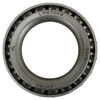




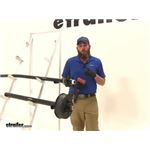
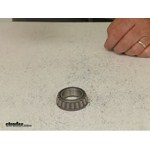



















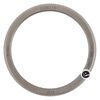
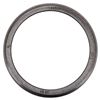
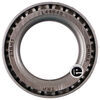

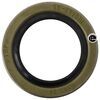
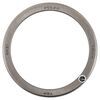




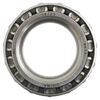









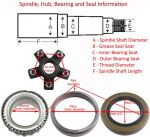
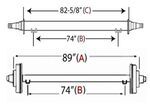

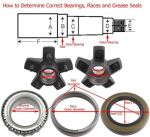
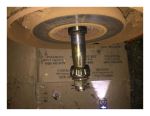
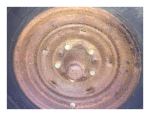
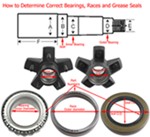
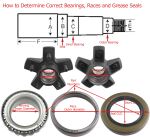

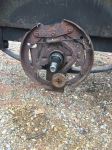

Katrina D.
5/8/2024
I am sorry that the bearings and seals showed up like that. Have any of them arrived with damage? Is everything there?